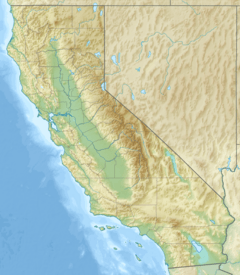China Peak facts for kids
Quick facts for kids China Peak |
|
|---|---|
| Location | Chinese Peak |
| Nearest city | Lakeshore, California |
| Coordinates | 37°13′47″N 119°09′30″W / 37.2297°N 119.1583°W |
| Top elevation | 8,709 ft (2,655 m) |
| Base elevation | 7,030 ft (2,140 m) |
| Skiable area | 1,200 acres (490 ha) |
| Runs | 45 |
| Longest run | 2.25 mi (3.62 km) (Academy) |
| Lift system | 11 lifts: 3 triples, 4 doubles, 2 handle tows, 1 t-bar, 1 moving carpet |
| Terrain parks | Firebowl Canyonlands Burton Progression/Ullmann's Alley |
| Snowfall | 300 in (760 cm) |
| Night skiing | None |
| Website | www.SkiChinaPeak.com |
China Peak is a fun ski area located in Central California. It first opened in 1958. The resort was named after the nearby mountain, Chinese Peak.
The original owner, Knut Flint, saw that skiers in the area had to travel far. They often drove to Lake Tahoe or Badger Pass. There were no other ski resorts on the southwest side of the Sierras. Mr. Flint wanted to create a closer option for them.
He hired Herbert Schwarz, an experienced ski expert from Austria. Mr. Schwarz helped get all the permits and managed the building of the resort. At that time, the Forest Service was happy to see new developments in the mountains. Even Walt Disney was thinking about building a resort nearby!
Building the First Ski Lift
The very first chairlift at China Peak was built in the summer of 1958. This chairlift was special because it was the longest in the U.S. at the time. It stretched over one mile and even had a stop in the middle.
The company that made the lift, Riblet Lift Company, used new ideas. For example, the support towers were not straight up and down. They were angled to match the ground. The chairs were also attached in a new way that made the ride smoother. This meant no bumpy feeling when chairs went over the tower wheels.
Since there was no electricity in the area, a huge diesel generator was brought in. A large fuel tank was also needed to power the lift for the whole season. Someone had to stay at the top or ride a snow-cat up each day. They needed to start the generator and the chairlift. Boyd Turner, the construction manager, helped with this, even though he wasn't a skier!
Early Challenges and Changes
The first year of China Peak was quite good. However, people soon realized there weren't enough places to sleep or eat nearby. Most skiers drove a long way from Fresno to get there.
To fix this, a lodge was built, designed by architect Art Lavanino. The owner, Mr. Flint, wanted a really nice place, even with an outdoor pool! A simple dorm was also added for staff and guests. This was a big and expensive project. To make the resort even better, a famous Austrian ski instructor was hired. He taught the newest skiing techniques.
The new hotel was finished just before one of the biggest snowfalls ever. The roads became very difficult to clear. Sometimes, the general manager had to follow a snow blower for hours just to reach the resort. The dorm building even collapsed under the heavy snow that year!
Because of all the snow, many skiers couldn't get to the resort for much of the winter. Without enough visitors, the resort faced financial difficulties. In 1960-61, new owners took over the resort.
A New Name and Return
In 1981, the Snow Summit company bought the resort. They changed its name to Sierra Summit for the 1982-1983 ski season.
Then, in the spring of 2010, the resort was sold again. The original name, China Peak, was brought back for the 2010-2011 season.
Today, China Peak is located on the south shore of Huntington Lake. It's about 65 miles (105 km) northeast of Fresno. China Peak has 1,200 acres (4.9 km2) of skiable area. Much of this area can be covered with man-made snow, thanks to snowmaking equipment.
 | Bayard Rustin |
 | Jeannette Carter |
 | Jeremiah A. Brown |



